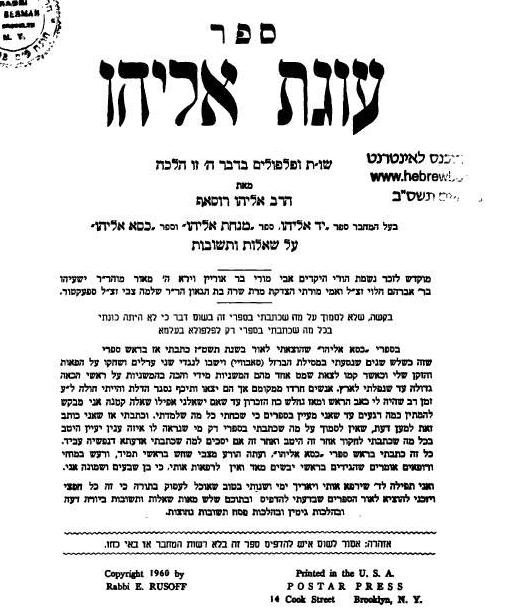Rabbi Eliyahu Rusoff was Rabbi was in the Bronx for many years, and authored several interesting works, mostly Responsa. c1952 the Rabbi was riding on the subway and two gentiles seated facing him were poking fun at his sidelocks and beard and as they got up to leave the train, one of them took the Mishnah volume he was holding and hit him on the head with the book, hitting him so hard that he fell down. They escaped, and the Rabbi spent the next years in pain, with headaches and loss of memory.
The author printed this story that occurred to him on the title page of every book he published after this event, stating that you can not rely on anything written in the book for practical purposes as his memory is now failing and the doctors do not want to attempt to heal him as he is aged 78...
Rabbi Rusoff had an interesting style in his writing, when he would be quoting or be responding to what has been written in another book, he often quoted the entire portion word for word, often several columns long. At times, it is hard to tell where the quote ends and his comments on it begin.
Some things of note from his books:
in כסא אליהו
דף יב: discusses gentiles who kept all their utensils kosher, and then converted, can their utensils be used?
כג: is וצוונו said at the circumcision of a Convert?
ל: Is Euthanasia permitted?
לג: Would the purchase of a buyer, who was sent seforim without his request, be considered legitimate or must we suspect that he purchased it out of embarrassment (pressure)? Ref. to Minchas Eliyahu [pg. 35a]
מ: sitting shivah when one knows death of a relative is imminent.
On the title page of his Yad Eliyahu, he writes that this book was written in a response to Ba'ale Batim who complained of authors who request their help to publish works of no use to them, this work was intended and can be understood even by the layman.
One of the sponsors of the book Minchat Eliyahu is Manfred R. Lehman
hat-tip: Ovadya Hoffman
Photo hat-tip: YD Miller
Thursday, July 10, 2014
Tenuvot Yehuda תנובת יהודה by Rabbi Reuven Fink An Interesting Bibliographical Note
Rabbi Reuven Fink (נולד תקצ"ה - נפטר תר"ס) authored a book titled Tenuvot Yehuda. The author writes on the title page, that any student of the talmud and it's commentaries who wants to study my book and can not afford it, shall reach out to me and I'll send him a copy for free.
The place of printing is described as Cracow, published by Yosef Fischer and dated 1896. On the title it states that the printing started in Tevet 5695 (1895) and halted in middle, until the author approached the printer Fischer in Cracow and through him the printed was completed in Adar 5696 (1896)...
At end of book, in the errata, the author writes how the mistakes are all the fault of the first publisher and for the sake of the first publisher he will not mention his name.
A look at the fonts used in the book shows that the first publisher published until page 98, the balance of book, as well as title, errata and introduction were published by the second publisher, in Cracow.
The place of printing is described as Cracow, published by Yosef Fischer and dated 1896. On the title it states that the printing started in Tevet 5695 (1895) and halted in middle, until the author approached the printer Fischer in Cracow and through him the printed was completed in Adar 5696 (1896)...
At end of book, in the errata, the author writes how the mistakes are all the fault of the first publisher and for the sake of the first publisher he will not mention his name.
A look at the fonts used in the book shows that the first publisher published until page 98, the balance of book, as well as title, errata and introduction were published by the second publisher, in Cracow.
Rabbi Yedidya Tia Weil Attesting to the scarcity of Selichot following the customs of the Jews of Alsace
I found an interesting variant of the 1782 Sultzbach Printing of the Selichot Minhag Alsace, with an extra page preceding the title page, containing a Haskamah from Rabbi Yedidya Tia Weil, who served as Av Bet Din of Karlsruhe and Baden as successor to his father, Rabbi Netanel Weil, since 1770.
He writes in the Haskamah
"ספו תמו אף הבלאות... Even tattered copies have been depleted"
Selichot with Alsace Minhagim have been published before this edition several times, including in 1722, 1750 and 1756 in Amsterdam and Fuerth.
Subscribe to:
Comments (Atom)










